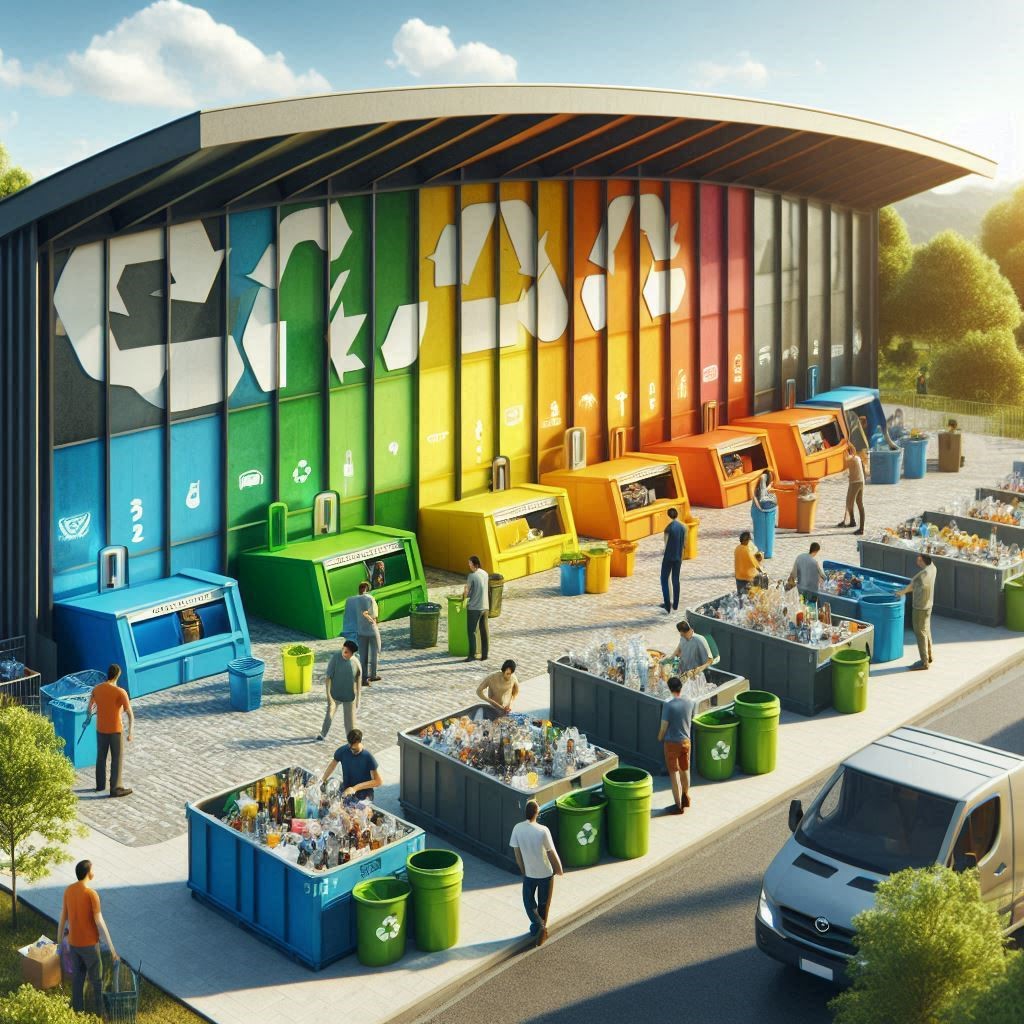- Introduction
- What is a Transfer Station and How Does it Work?
- Benefits of Using the Buncombe County Transfer Station
- Types of Waste Accepted at the Transfer Station
- How to Use the Buncombe County Transfer Station Services
- Tips for Efficient and Safe Disposal
- Frequently Asked Questions about Transfer Station Services
- Buncombe County Transfer Station: Tips for Hassle-Free Waste Disposal
- Conclusion: Buncombe County Transfer Station Hours, Location, and Services Explained
- FAQ’s
- General Information
- Waste and Recycling Services
- Special Programs and Policies
Introduction
Are you tired of clutter piling up around your home? Do you want to know the best and most efficient way to dispose of unwanted items? Look no further than the Buncombe County Transfer Station. This essential resource serves as a vital link in waste management for residents, ensuring that trash is handled responsibly and sustainably. Whether you’re tackling a major decluttering project or just need to offload some old appliances, understanding how the transfer station works can make all the difference. Dive into this comprehensive guide to discover everything you need to know about Buncombe County Transfer Station services!
What is a Transfer Station and How Does it Work?
A transfer station is a vital hub in the waste management process. It serves as an intermediary facility where garbage and recyclables are collected before being transported to their final destination, such as landfills or recycling centers.
At a transfer station, waste from various sources arrives via trucks or other vehicles. This material is then sorted and compacted to maximize space. By consolidating waste at one location, it reduces transportation costs and environmental impact.
The operation of a transfer station involves several steps. First, incoming vehicles unload their loads onto designated areas. Workers then sort through the debris for recyclables or hazardous materials that require special handling.
Once sorting is complete, the remaining waste gets compacted into larger containers for easier transport. From there, these containers are dispatched to appropriate disposal sites across Buncombe County and beyond.
Benefits of Using the Buncombe County Transfer Station
Using the Buncombe County Transfer Station offers numerous advantages for residents. For starters, it provides a convenient solution for managing waste disposal. No more long drives to distant landfills; you can easily drop off your trash closer to home.
The facility is designed to handle various types of waste efficiently. This means you can sort and dispose of everything from household garbage to yard debris without hassle.
Another significant benefit is environmental responsibility. The transfer station promotes recycling and proper waste segregation, helping reduce landfill overflow and supporting sustainable practices in the community.
Accessibility also stands out as a key feature. With flexible hours, residents have ample opportunity to visit at their convenience, making it easier than ever to keep our neighborhoods clean.
Using local services fosters community engagement. When people utilize the transfer station, they contribute directly to maintaining the beauty and health of Buncombe County’s environment.
Types of Waste Accepted at the Transfer Station
Buncombe County Transfer Station accepts a wide range of waste materials. This includes general household trash, yard debris, and construction waste.
Household items like furniture and appliances are also welcome. Whether it’s an old mattress or a broken refrigerator, you can dispose of these larger items here.
For those tackling garden projects, yard waste such as branches and leaves is accepted too. It’s a great way to keep your outdoor space clean without taking up precious landfill space.
Special categories include hazardous materials like paint or batteries, which require specific handling procedures. Always check the guidelines before bringing these items in.
Electronics disposal is another essential service offered at the transfer station. Old computers and televisions can be safely recycled instead of ending up in landfills.
How to Use the Buncombe County Transfer Station Services
Using the Buncombe County Transfer Station is straightforward. First, gather all your acceptable waste materials. Make sure to separate recyclables from regular trash.
When you arrive at the transfer station, follow the posted signs and instructions from staff. They are there to assist you and ensure efficient operations.
Be prepared for any fees that may apply based on the type or weight of your waste. It’s a good idea to have cash or card ready for quick payment processing.
Once inside, carefully unload your items in designated areas. Keep safety in mind—watch out for heavy machinery and other vehicles while moving around.
If you’re unsure about what can be disposed of, don’t hesitate to ask an attendant for guidance. This will help minimize contamination in recycling streams and enhance overall efficiency.
Tips for Efficient and Safe Disposal
When using the Buncombe County Transfer Station, preparation is key. Start by sorting your waste into appropriate categories: recyclables, yard waste, and general trash. This step simplifies the disposal process and can help minimize delays.
Next, ensure you are aware of the station’s operating hours before heading out. Arriving early can save you time and prevent long waits.
Always secure items in your vehicle to avoid spills or accidents during transport. Keep hazardous materials clearly labeled and separated from other types of waste.
Respecting facility rules promotes a safe environment for everyone involved. Follow signage and staff instructions closely to enhance efficiency.
Consider bringing along necessary tools like gloves or tarps for added safety while unloading items at the transfer station. These small precautions make a significant difference in your overall experience.
Frequently Asked Questions about Transfer Station Services
People often wonder about the operating hours of the Buncombe County Transfer Station. Typically, it’s open several days a week to accommodate various schedules.
Another common question is regarding fees. Most waste disposal services are affordable, but certain items may incur additional costs. It’s wise to check ahead before your visit.
Many also ask what materials can be dropped off. The transfer station accepts a wide range of waste types, including household debris and yard waste.
Residents frequently seek guidance on whether they need to sort their trash beforehand. While some sorting might be necessary for recycling purposes, most general refuse can go in together.
Some users are curious about ID requirements for use. Generally, proof of residency in Buncombe County is required to access these services without issues.
Understanding these details helps streamline your experience at the transfer station significantly.
Buncombe County Transfer Station: Tips for Hassle-Free Waste Disposal
When visiting the Buncombe County Transfer Station, preparation is key. Always sort your waste beforehand. Separate recyclables from general trash to streamline the process.
Arrive early in the day for shorter lines. The busiest times tend to be weekends and holidays. If possible, plan your visit during weekday hours for a smoother experience.
Wear appropriate clothing and sturdy shoes. You might encounter uneven terrain or heavy loads while unloading waste. Safety should always come first.
Bring necessary paperwork if applicable, such as proof of residency or any special permits required for specific types of disposal. This can save time at check-in.
Remember to follow posted guidelines and staff instructions on-site to ensure an efficient drop-off process without complications.
Conclusion: Buncombe County Transfer Station Hours, Location, and Services Explained
Buncombe County Transfer Station offers essential services for residents looking to dispose of waste responsibly. Located conveniently within the county, it provides a vital link in the waste management process.
The transfer station operates on specific hours, making it easy for you to plan your visit. It’s crucial to pay attention to those times so that you can maximize your efficiency during disposal.
Services available at the Buncombe County Transfer Station include handling various types of waste like household debris, recycling materials, and yard waste. Having clarity on what is accepted will help streamline your experience.
For exact hours and location details, visiting the official Buncombe County website ensures you’re up-to-date with any changes or announcements regarding operations. Embracing these services not only contributes positively to our environment but also supports community cleanliness efforts throughout Buncombe County.
FAQ’s
General Information
The Buncombe County Transfer Station is a facility where waste is collected from various sources and then transferred to a larger processing or disposal facility. It serves the residents of Buncombe County, helping manage and streamline waste disposal.
The main Transfer Station is located at 85 Panther Branch Road, Asheville, NC 28806. There are also other facilities in the county for convenience.
Typically, the Transfer Station is open from Monday to Saturday, 7:00 AM to 4:00 PM. It is closed on Sundays. However, hours can vary on holidays, so it’s best to check the latest schedule online or by calling ahead.
Waste and Recycling Services
The Transfer Station accepts a variety of waste types including household trash, recyclables (like paper, plastic, and metal), yard waste, and bulky items like furniture and appliances. Hazardous materials such as chemicals and batteries should be taken to a designated hazardous waste facility.
Yes, items such as hazardous materials (e.g., paint, pesticides), electronics, and large amounts of construction debris are not accepted. Check with the Transfer Station for specific guidelines and alternative disposal options.
Fees can vary based on the type and amount of waste being disposed of. Generally, residential waste may have a minimal fee, while commercial or bulk waste might incur higher charges. It’s best to consult the Transfer Station’s fee schedule for detailed information.
Special Programs and Policies
Yes, the Transfer Station supports recycling programs for various materials including paper, plastics, glass, and metals. There are designated bins and areas for recyclables to ensure proper sorting and processing.
No, hazardous materials should not be dropped off at the Transfer Station. Instead, these materials can be taken to the Buncombe County Hazardous Waste Collection Center for safe disposal.
Large items and appliances can be dropped off at the Transfer Station. However, it is advisable to check with the facility for any specific requirements or scheduling procedures, especially for large or bulky items.
Occasionally, Buncombe County hosts special events for recycling and waste disposal, such as electronics recycling drives or bulky waste collection days. These events are usually announced through local media and the county’s official website. Keep an eye out for updates or contact the Transfer Station for more information.



